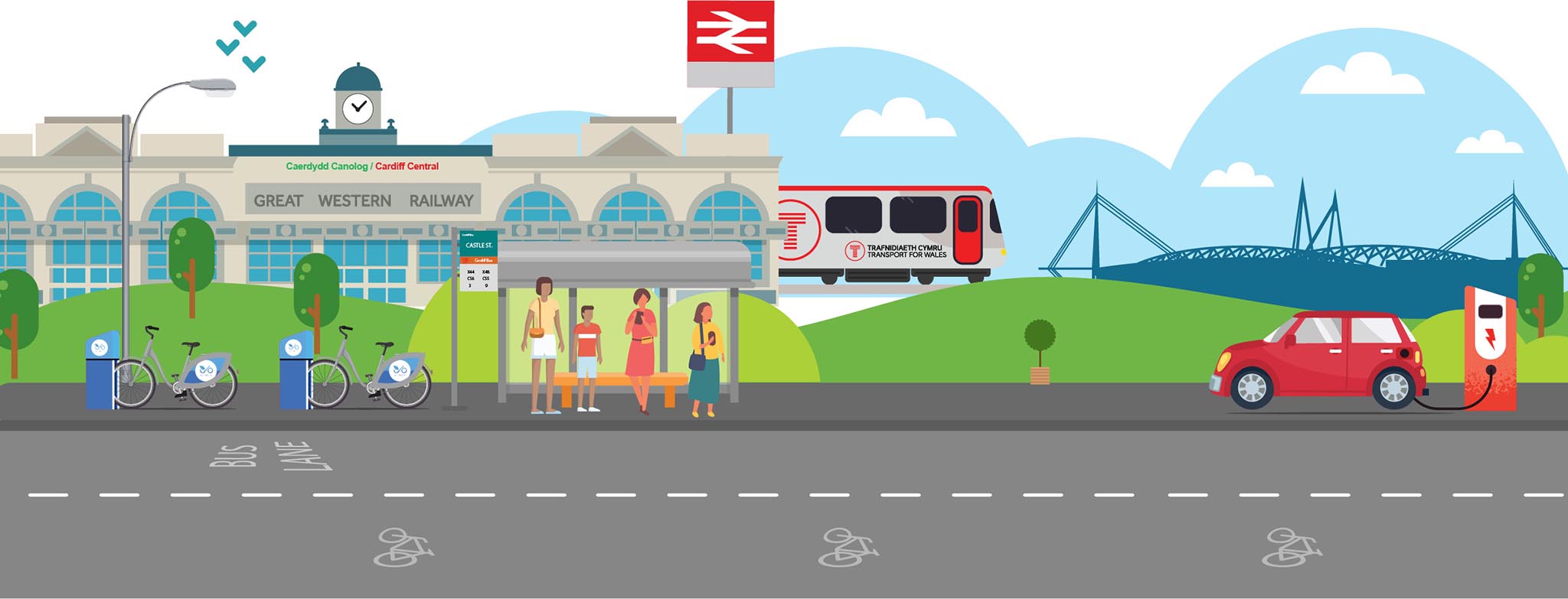Our vision for a Carbon Neutral City by 2030
One Planet Cardiff – a strategic response to the climate emergency.
Climate Change is already shaping our lives. We are living in a climate emergency with stark warnings and evidence globally that urgent action is needed if we are to avert the dangers ahead. Our One Planet Cardiff Strategy (6mb PDF) proposes a wide range of ambitious actions that will begin to form the basis of a delivery plan to achieve Carbon Neutrality. It aims to do this in a way that supports new green economies and greater social wellbeing in the city.
Read our press release on the strategy.
Read our Action plan (9mb PDF) .
Follow us on social media for the latest updates:
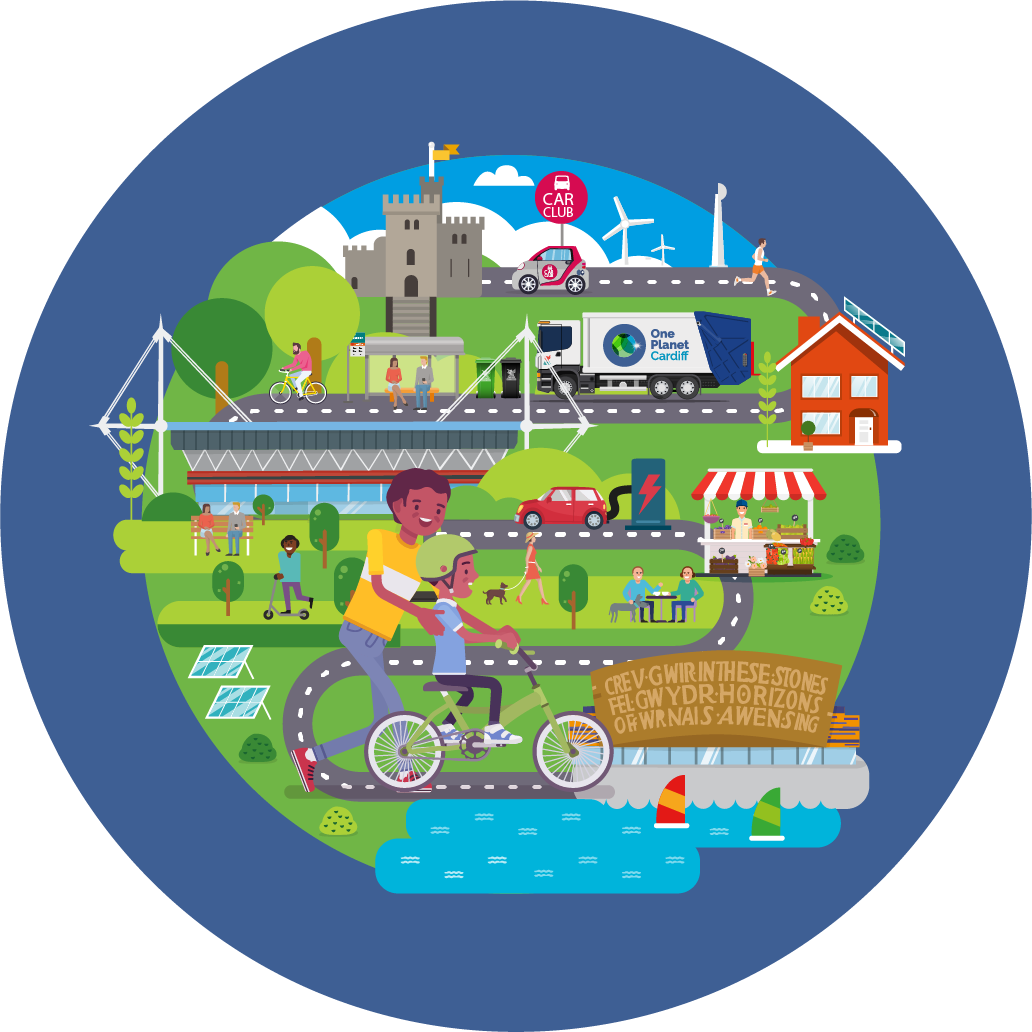

Cardiff Council has a target to be Carbon Neutral by 2030. Work has started with city-wide partners to develop a road map and action plan for a Carbon Neutral City by 2030

Where we are now – A Carbon Analysis
If we want Cardiff to become carbon neutral, then one of the things we need to know is the volume of carbon emissions we as the Council are responsible for and how much the city of Cardiff as a whole produces.
Although we have been working on reducing our carbon footprint for may years, we chose 2019/20 as our baseline year and have been measuring our progress since then. This brings us in line with Welsh Government reporting guidelines.
The Council’s carbon baseline showed that direct emissions stood at 51,979 tonnes CO2 e in 2019/20. That figure showed an 18% reduction in 2023/24, to 42,665 tonnes CO2 e.
This is how those emissions break down:
Council Operational Emissions KgCO2 e
In 2019 it was estimated that annual emissions across the entire city boundary stood at almost 1.8 million tonnes CO2e. The latest available data for 2023 shows a 14.7% reduction from 2019, at 1.55 million tonnes CO2e.
This is how it breaks down:
Whole city carbon 2023 (1.55m tonnes CO2e)
| Type | Tonnes CO2 | Percentage |
|---|---|---|
| Transport | 681.6 | 43.9% |
| Domestic | 361.6 | 23.3% |
| Industry | 174.0 | 11.2% |
| Public Sector | 84.5 | 5.4% |
| Waste Management | 56.7 | 3.7% |
| Commercial | 175.6 | 11.3% |
| Agriculture | 9.5 | 0.6% |
| LULUCF Net Emissions | 7.6 | 0.5% |
What are we doing – Our projects
Find out about the actions we are taking to address climate issues.
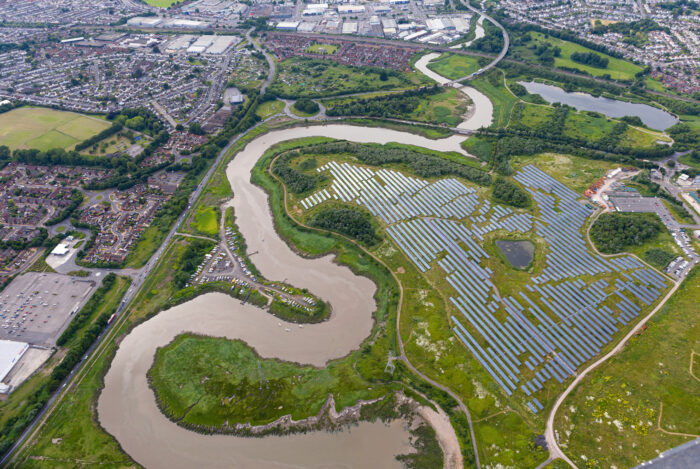
Lamby Way solar farm produces 9mw (megawatts) of green electricity. That is enough to power 2,900 homes.
It can be a challenge to make space for energy generation in a dense city like Cardiff. To tackle this, the solar farm is on an old landfill site.
As well as reducing Cardiff’s greenhouse gas emissions, the project has increased biodiversity by sowing wild plant seeds and providing refuges for the rare reptiles, bats, and birds that inhabit the site.
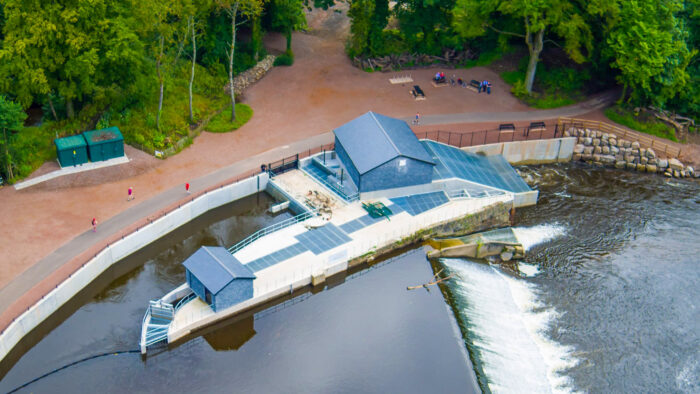
The Taff Trail is one of Cardiff’s oldest active travel routes and is now home to an innovative hydroelectric power station. The hydro scheme produces almost half a megawatt of green electricity. That is enough to power 550 homes.
The hydro scheme uses water from the River Taff to turn 2 Archimedes screw turbines. The turbines create the power. We continually work on the hydro scheme to make sure we maximise energy generation.
Maintaining the health of the river is also a key focus. The hydro scheme uses fish pass technology to make sure the fish migratory routes are not disrupted.
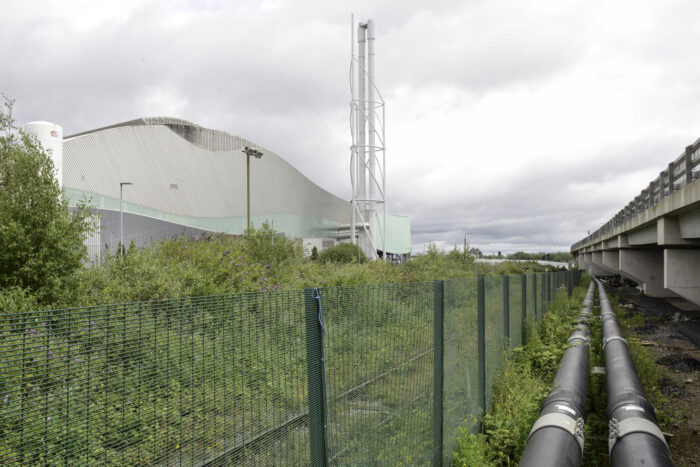
Cardiff Heat Network uses excess heat from a waste incinerator to provide sustainable heat to buildings in Cardiff Bay.
The incinerator burns non-recyclable waste to produce steam. The steam powers turbines to generate 266 MWh (megawatt hour) of electricity. The heat network traps the heat from this steam and uses it to provide heating and hot water.
Buildings that connect to the network will no longer need their own gas boiler and their greenhouse gas emissions will go down by up to 80%.
The project will save over 10,000 tonnes of carbon emissions. This is roughly the same as the carbon produced from heating 3,700 homes.
The network supplied heat to its first customers in November 2025. Construction of the heat network is due to be fully completed by spring 2026.
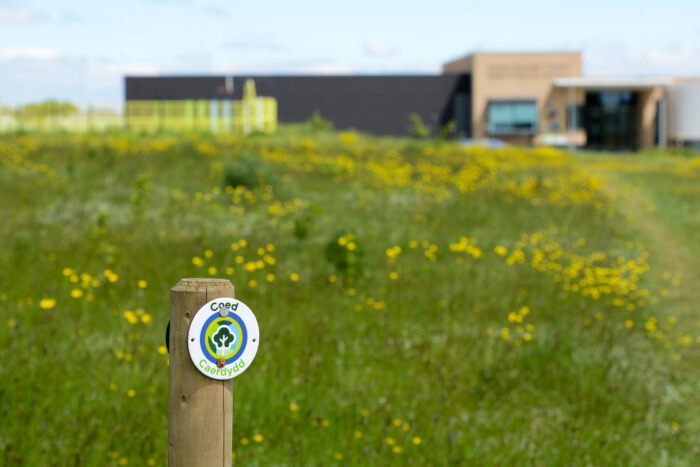
Coed Caerdydd is a 10 year programme of tree planting. The aim is to increase Cardiff’s tree cover from 18.9% to 25% of the city’s land area.
82,000 trees have already been planted across 280 sites with help from multiple council departments and almost 3,000 volunteers. Examples of the sites are:
- Trelai Park in Caerau
- Coed Glas Primary School in Llanishen
- Heol Danyrodyn verges in Pentyrch
These trees will take around 2,540 tonnes of carbon dioxide out of the atmosphere over the next 100 years. They will also provide shade and habitat for wildlife and improve flood resilience.
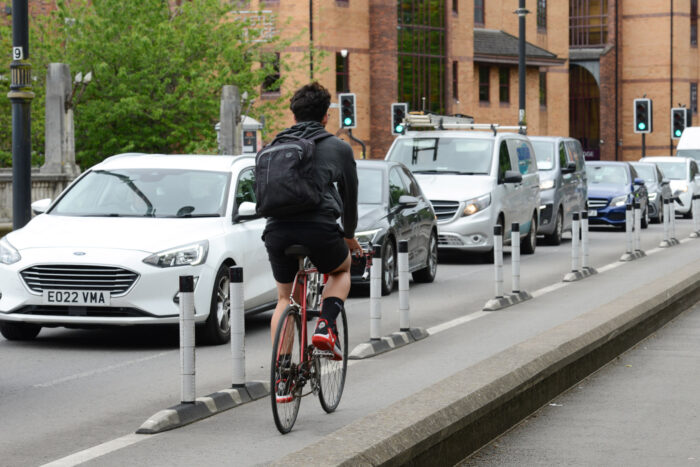
Active travel is a key part of Cardiff’s ambition to create a greener and healthier city. We have built 7 miles of separated cycleways to encourage people to choose active travel.
Separated cycleways are built away from the road which helps cyclists feel safe whilst travelling.
Once the network is completed, it will be much easier to cycle throughout the city and beyond. The cycleways will connect with public transport hubs, such as bus and train stations.
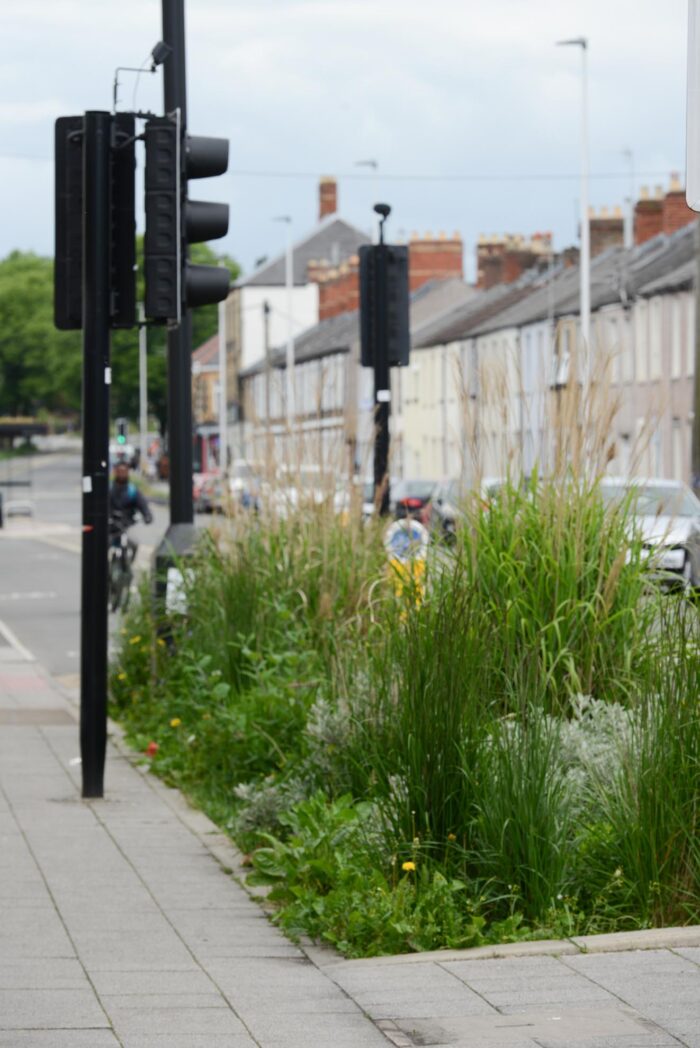
Sustainable Urban Drainage (SuDs) help manage surface water (rainfall) and reduce flood risk. We have already introduced SuDs across the city, including in:
- Grangetown
- Central Square (Wood Street)
SuDs schemes have features such as rain gardens. The schemes make an area greener and improve biodiversity.
Over 52,000 m2 of surface water has been removed from the waste water network and flows straight into the River Taff because of the Greener Grangetown and Central Square schemes. This is the equivalent of around 10 football pitches. As a result, there is a reduced risk of sewers flooding in these areas.
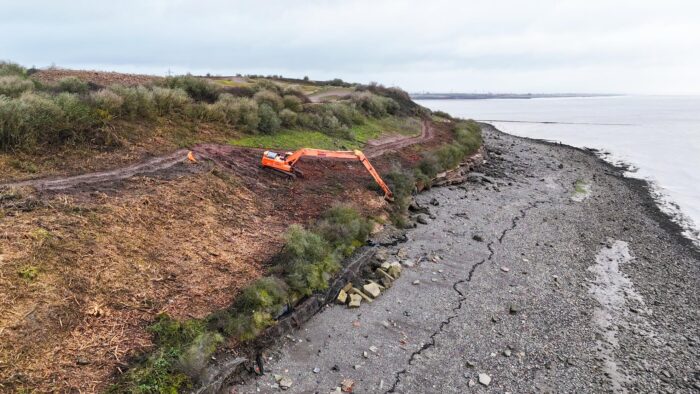
Through the Cardiff coastal scheme, we will install over 80,000 tonnes of rock on the shore and sheet piling (a metal wall) to a depth of 19m along the edge of the River Rhymney80,000 tonnes are around 2,500 bin lorries.
This will protect South-East Cardiff against waves and tides for the next 100 years.
We have future proofed the scheme to take into account future climate change predictions. It is also designed to withstand a 1-in-200 years severe weather event.
The scheme will be completed by summer 2027.
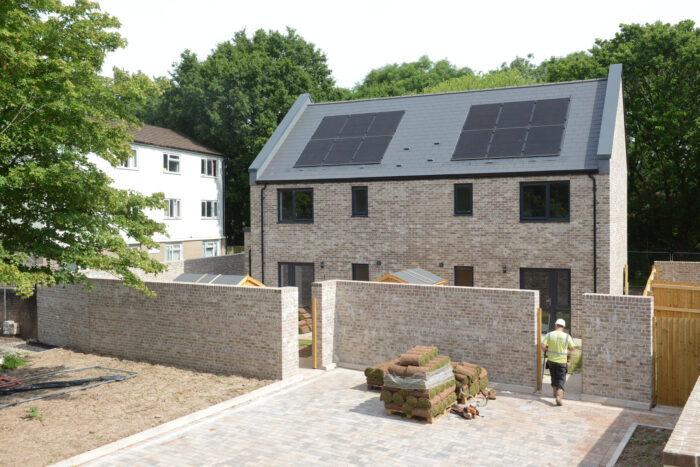
We have partnered with Wates Residential to create Cardiff Living. Cardiff Living build new energy efficient council and private homes.
In Heath, there is a scheme of 42 homes that are:
- low energy,
- highly insulated, and
- affordable.
The homes will help reduce resident’s energy usage and carbon emissions. This also helps tackle fuel poverty.
On Croft Street in Plasnewydd, there is a scheme of 9 two-bed council homes that have been built to Passivhaus standard. The homes should have low running costs because of the energy efficient features, such as the home being air-tight and having high insultation. The homes have private back gardens, bike and bin storage, and small front gardens to create space between the home and the pavement. The scheme incorporates a sustainable urban drainage system and green infrastructure to make sure storm water does not affect the existing drainage system.
Find out more about energy efficiency in your home.
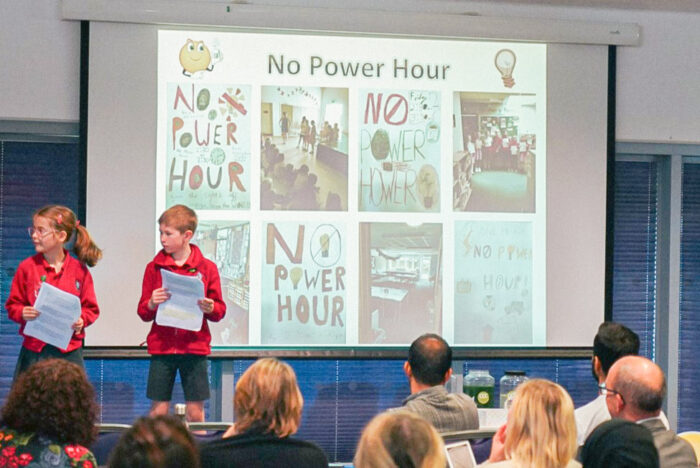
As of September 2025, 65 schools have signed the One Planet Cardiff Schools Pledge.
This pledge is a key part of Cardiff Council’s response to the climate emergency, encouraging schools to embed climate education into the curriculum, create pathways into green careers, promote climate action, and inspire pupils to become champions of change.
At our recent One Planet Cardiff Schools Summit, schools had the chance to showcase the sustainability work they’ve undertaken throughout the year. From food growing and community initiatives to waste reduction and classroom campaigns, the variety and creativity on display was inspiring.
Kitchener Primary School was awarded the top prize for their outstanding ‘eco-city’ project and accompanying presentation – a brilliant example of innovation and whole-school engagement.
This was just a glimpse of the incredible work happening across Cardiff’s schools, as they lead the way in building a greener, fairer future.
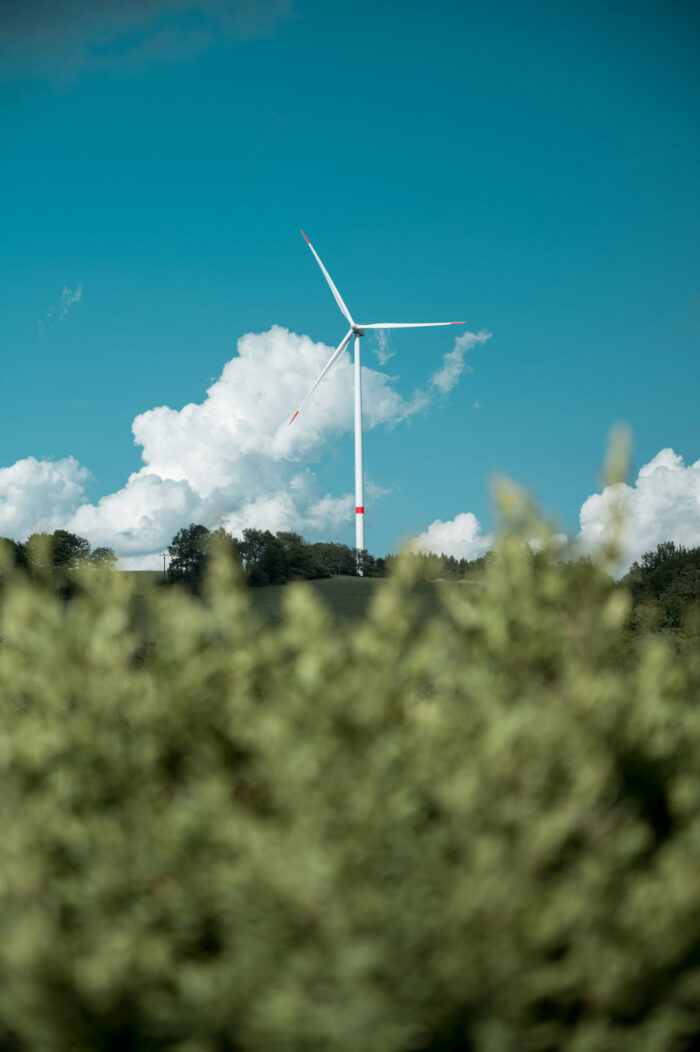
Welsh Government have funded the production of Local Area Energy Plans for all councils in Wales.
The Cardiff LAEP is an advisory document that outlines a vision for what net-zero carbon energy could look like in 2050. Some of the key targets are to install:
- energy efficient and insulation measures in 91,000 homes,
- 160,000 heat pumps in domestic and commercial properties to move away from gas as a heat source,
- 26,000 electric vehicle charging points for public use and for householder use,
- rooftop solar panels on 100,000 properties to generate 510mw (megawatts) of power,
- ground solar farms to generate 120mw of power,
- wind turbines to generate 19mw of power.

We have reduced Cardiff’s carbon impact through sustainable food buying in schools and city-wide waste reduction initiatives.
The Welsh Veg in Schools scheme supports local, organic, and regenerative farming, and decreases food transport emissions. It can also provide environmental education to students through farm visits.
A network of community fridges is helping to reduce food waste by allowing communities to share excess food. The Cardiff Capital Region project, which is led by FareShare, is also exploring methods to transform excess food into nutritious meals for local communities.
What changes can you make?
- Get a SMART meter to help you understand and manage your energy consumption and costs.
- Check your loft insulation, doors and windows to prevent heat loss and reduce and manage your carbon footprint. If you live in rented accommodation check that your landlord is aware of the rules about energy efficiency and encourage them to look into opportunities for Improvement
- Switch to a green energy tariff. This involves choosing a supplier and tariff that only sources energy from renewable generators such as wind, solar or Anaerobic Digestion. This could reduce emissions by 79%, saving 1.25 tonnes of carbon each year for the average home.
- Consider having solar PV panels or solar hot water at your home.
- Insulate your home to reduce heat loss and drafts. By saving energy through better insulation, smarter heating or appliances, the average household could reduce its carbon emissions by 0.6%.
- Consider how much energy you are using. Could you use less or switch certain appliances off to save carbon and money? Turning down your heating 1 Degree Celsius can save 3% off your energy bills.
- If you are in receipt of means tested benefit or have a health condition that is made worse by a cold home and live in an inefficient private property you may be entitled to NEST support to install energy efficiency measures
- Volunteer with our Park Ranger Team or join a local park Friends Group who have a shared interest in biodiversity issues.
- Make more sustainable use of your garden by planting trees or bushes or growing fruit and vegetables as an alternative to paving, artificial grass or decking.
- When possible, walk or ride your bike in order to avoid carbon emissions completely.
- Consider switching to an electric or hybrid vehicle if you are replacing your car as this could save 2 tonnes of carbon per year. If this isn’t affordable, choose a more efficient diesel or petrol vehicles, as this could save 0.9 tonnes of CO2 each year.
- Think about how your travel patterns changed and how you shopped locally during the lockdown, and see if you can continue these habits going forwards.
- Pass any unwanted larger items that you want to throw away to someone in need or an organisation that accepts them. These items can be reused and redistributed to someone else in need.
- When drying clothes, if the weather permits, dry your clothes using a clothes line or airer rather than a tumble dryer.
- Use a reusable water bottle when you are at home and on the move. Plastic production leads to a lot of carbon emissions so you’ll be lowering both your water and carbon footprint.
- Don’t put hot items in either the fridge or` the freezer. If you let your leftovers cool before putting them in the fridge, less energy is required from your fridge to keep them cold. Your fridge is one of the biggest consumers of energy in your home so any added efficiency helps.
- Clean out your fridge more often. You can reduce the energy your fridge uses by cleaning out any food you are not going to eat. When food sits in the fridge, it takes up space and energy. Clean out your fridge weekly but don’t leave it too empty, otherwise it won’t maintain its cold temperature.
- Reduce, reuse and recycle as much of your waste as possible. This includes recycling any old clothes rather than throwing them away. By reducing the amount of waste you produce and recycling more, emissions from an average home could fall by 0.25 tonnes each year.
- If you have space in your garden, consider home composting uncooked food, such as vegetable or fruit peelings rather than using the Council composting services. All leftover cooked food has to be put in the food waste caddy for collection though.
- Join a Love Where You Live volunteer group to help the community you live in.
- Eat locally produced seasonal fresh food. This reduces the carbon emissions of processing, storage and transportation.
- Cook smart as much as possible. The most environmentally friendly way of cooking is using a stove-top or a microwave.
- If you have space in your garden, grow your own fruit, vegetables and herbs at your property.
- Try going vegan or vegetarian for one day a week, reducing meat and dairy intake reduces carbon emissions.

You can visit the Climate Action Wales website to find out about some simple every day changes you can make to reduce your impact on the planet.
Cardiff residents’ stories
Find out what some Cardiff residents are doing to be greener.
Buying a little less and recycling a little more is one of the key green choices we can all make on a day to basis. In Cardiff alone, recycling saves in the region of £11 million a year, as well as saving around 36,000 tonnes of carbon emissions and one Cardiff household in particular, is making recycling look easy – last year they only put out 6 black bags of non-recyclable waste.
Heather, who lives in Splott says “I don’t really think about it now, it’s just what we do. Most things can be recycled just by leaving them out for Cardiff Council to collect or taking them to a recycling centre, and there are loads of little schemes out there for things that can’t be recycled that way – like blister packs of medicine, they can be taken to Superdrug.”
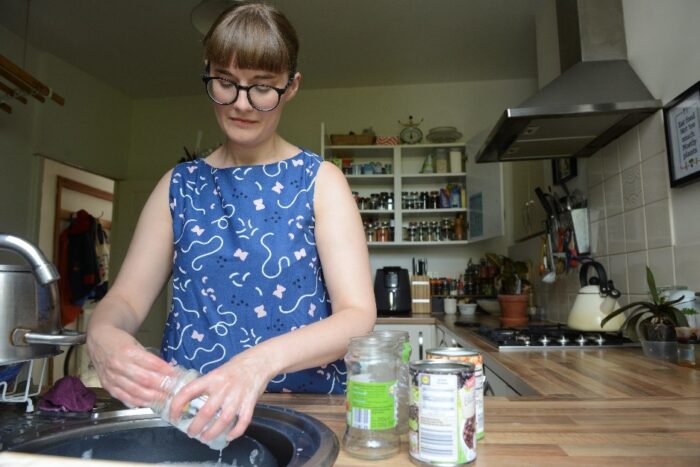
Heather, rinsing jars and cans ahead of putting them out to recycle or reusing the jars.
Although there are only two people in their household, which Heather admits, makes it easier, she’s convinced most people could create a little less waste, and recycle a little more.
“We do a lot of shopping at zero-waste stores,” she says. “I never throw away a jar now, and it’s much cheaper, especially for things like spices, and if you get washing up liquid, it can be half the price, because you’re not paying for packaging, and there’s still lots of single-use plastic supermarket packaging that can’t be recycled.”
But it’s not just Heather who benefits from her recycling habit, it’s the local community as well. “All the little social media groups that sprung up during Covid are great for recycling. If there’s something I don’t need anymore, I just pop a message on there – there’s always somebody who’ll say “ooh, I’ll can use that.
“This year we’re hoping to recycle even more – we’ve only just put out our second black bag of the year.”
The new ‘sack sort’ recycling scheme being rolled out across the city is already increasing the amount of waste in Cardiff that can be recycled – the latest household recycling figures show that around 92% of waste collected from residents’ homes via the new system can be recycled. Under the co-mingled green bag scheme only 70% of material collected is able to be recycled.
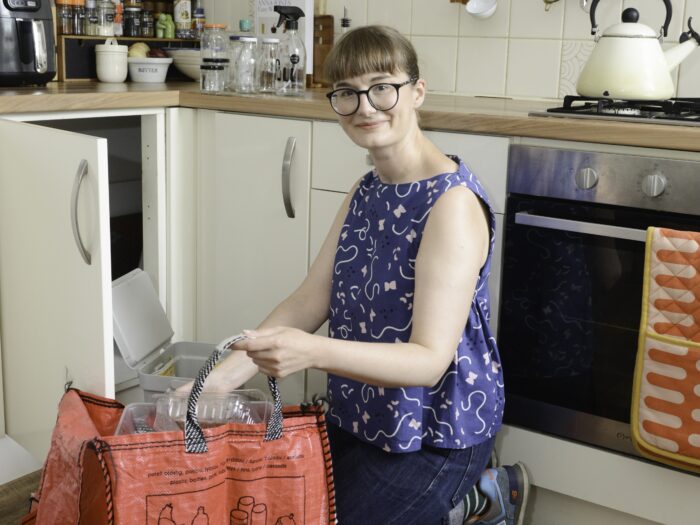
Heather, sorting her plastic recycling into a red sack.
After being collected, non-recyclable waste in Cardiff is burned at the Viridor Energy Recovery Facility and used to create enough electricity to power 30,000 homes.
As part of its One Planet Cardiff strategy for a carbon neutral city, Cardiff Council is also near to completing construction of a new low-carbon District Heat Network. The Heat Network will connect to the Viridor facility and transfer excess heat, created as a by-product during incineration, via a network of pipes to large public buildings in Cardiff Bay, providing them with low-carbon heat and hot water and reducing their emissions by approximately 80%.
Garden waste is also recycled and turned into compost, some of which is used to help grow flowers in Cardiff’s parks, while food waste is processed at anaerobic digestion facility operated by Welsh Water and used to create enough biogas to power 2,000 homes.
Despite this, Heather still believes reducing the among of waste we create, by buying less, and reusing and recycling as much as we can is the right choice to make. “If you think about all the carbon that’s tied up in the things we buy, all the energy used to create them, it just makes sense. On top of that, it’s cheaper – and every small green choice means a brighter future for us all. If I can do it, most people can.”
Heather’s top tips for recycling more:
- Create less waste in the first place – buying a little less will save you money, as well as reducing emissions and creating less packaging to dispose of.
- Shop at your local zero-waste store – you might even find it cheaper.
- Make use of local community groups on social media – it’s better to give something away than throw it away.
- Check the store where you bought a product for in-store recycling schemes.
- If you’re not sure whether something can be recycled or not, or how, check Cardiff Council’s Recycling A-Z online.
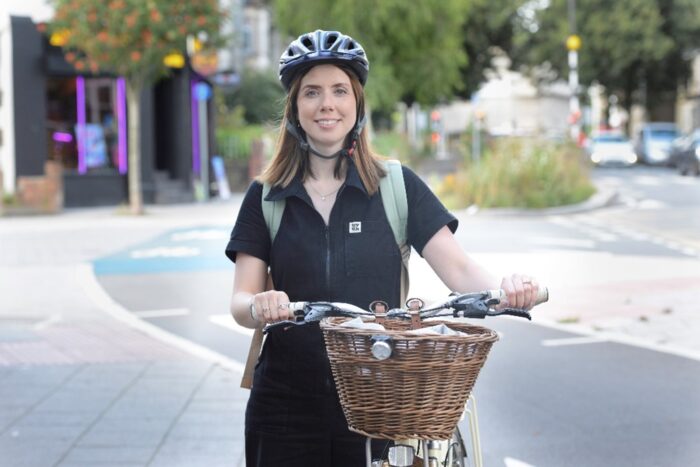
Caroline with her bike at one of Cardiff’s new segregated cycleways
With 37 miles of traffic-free paths away from the road, and seven miles of cycleways on Cardiff’s roads now safely segregated from traffic cycling is a great way, for those who are able, to get quickly and safely from A to B while saving money and staying fit and healthy.
The cycleways have been installed as part of Cardiff Council’s One Planet Cardiff plan to enable people living, working and visiting the city to make greener choices – like choosing walking and cycling instead of the car – and create a pathway to a carbon neutral city.
But if you’re anything like Caroline from Roath, who by her own admission was “a nervous cyclist” the prospect of getting on your bike for the first time can still feel daunting.
“I was never one of those kids that lived on a bike,” Caroline explains. “But when I went travelling overseas, I was living somewhere that a bike was just the best option to get to work. That was the start for me.”
Now living in Cardiff, Caroline cycles every day. “I just feel good cycling. I cycle almost every day of the year, rain or shine – there’s no such thing as bad weather, just bad clothes.”
“I really like being outside on the bike, it’s so satisfying when you’re in the cycle lane and you see all the traffic and you’re like, bye!”
“I really like starting the day on the bike, I arrive at work and I don’t feel stressed. I’ve got two jobs, one in Cardiff and one in Monmouthshire that I have to drive to, and I really notice the difference on those days.”
But it’s not just the wellbeing benefits Caroline enjoys – the money saving is a big factor. “Once you’ve got your bike, and it’s maybe £50 to pick up a second hand bike, you’re away. I know that isn’t cheap for everyone, but once you’ve got it, it’s free and you don’t need to pay for parking, pay for a bus ticket. Plus you don’t have to wait for anyone, wait for a bus, wait in traffic.”
But how do you get from being nervous of cycling to doing it every day?
“Practice first – the Council run adult cycle training courses that are free for anyone who lives, works or studies in Cardiff or if you’re a bit more confident then maybe just go round the park on the weekend, when you’ve got no deadlines, no rush.
“Make it fun so you want to get on the bike and then, once you’re comfortable, you can start out on street where there’s traffic.”
“It’s also a worth planning your route, so you can think about where the cycle lanes are. There’s a free walking and cycling map available that can help with that.”
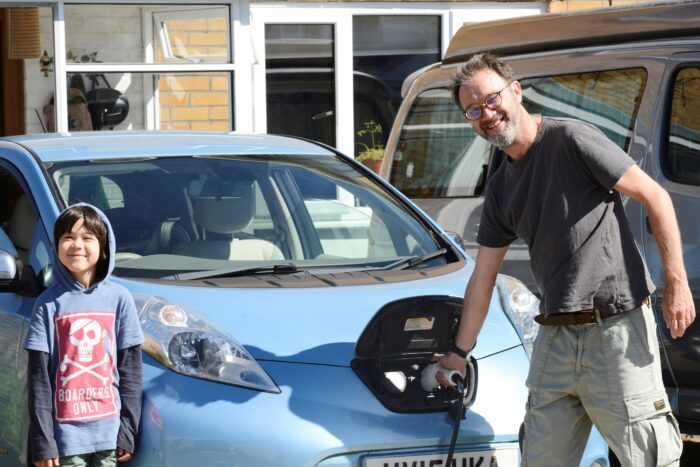
Reuben, charging his electric vehicle.
As an Occupational Therapist, Reuben Morris spends his days driving the streets of Cardiff to visit clients in their homes. He’s the first to admit it would be “very difficult” to do his job without a car – but six years ago he made the green choice to switch to an electric vehicle and now, despite the miles he clocks up every day, he never spends a penny on petrol.
“I got a cheap Nissan Leaf off Gumtree and that,” Reuben explains, “was my gateway into green technology. Since then, it’s become a bit of an addiction. I realised I could charge it from solar panels, and it all went from there. Now we’ve got battery storage and a heat pump as well and our energy supplier pays us!”
Transport is the biggest cause of carbon emissions in Cardiff – making up 35% of the 1.78 million tonnes of CO2e generated in the city every year, so every green choice made by people like Reuben today – whether that’s walking or cycling a little more or switching to an electric vehicle – adds up to a brighter future tomorrow.
With a growing network of approximately 200 publicly accessible electric vehicle chargers now available in Cardiff, and more expected to be introduced as part of Cardiff Council’s One Planet Cardiff response to the climate emergency as well as by the private sector, the infrastructure to support EV vehicles is improving, but Reuben admits to some early ‘range anxiety.’
“I bought the car from Swansea. I got the train up to get it and drove it back and I remember coming back and being terrified whether I’d make it – but that’s dropped away. I’ve never run out of charge in 6 years, so I never worry about it. It’s not a particularly range-busting EV, but if you don’t have that type of job, you’re not a sales rep or something, you don’t often jump in the car and drive 300 miles – everywhere in Cardiff is completely accessible to me.”
“I’m pragmatic about it though – I’ve still got a petrol driven campervan to use for holidays and occasional trips – but I will not get a petrol car again if I’ve got any choice. The driving experience is much better and I’m lucky enough to have a drive, so I plug in at home, charge it overnight and it is just so much more convenient than using petrol stations.”
With an electric vehicle covering the majority of his car journeys, and domestic emissions from things like lighting and heating being the second largest source of emissions in Cardiff, Reuben’s attention turned to adding even more green technology to his home.
Now, with solar panels on his roof and a battery to store the energy, plus a ground source heat pump to heat his 1970s built end of terrace family home, his energy – including heating, hot water and electricity – costs him approximately £10 a month for the majority of the year. Then, from May to August, when his home produces more solar energy than he and his family can use, the unused energy is exported to the National Grid, and his energy company pay him.
That all adds up to around £320 profit on energy every year – plus the savings Reuben makes from not paying for petrol.
“I’ve got east-west solar, which isn’t the recommended layout, but I’ve got panels on both sides of the roof and at the moment, I’m charging my vehicle, doing all of my work miles, all of my shopping miles, all the basic use of the car, plus I’ve got hot water from the heat pump and right now,” he adds with a smile, “I’m getting about £100 a month from my energy supplier.
“Even during the winter, when we need to import some electricity from the grid, the solar still takes the edge off our bills. We haven’t had to change our behaviour at all, we live normally with it – the only thing we’ve found, thanks to our smart meter, is that the electric shower uses as much electricity as charging a car, so we tend to take baths!
“There’s a lot of negative information about heat pumps out there, but they use them in Scandinavia and they work – we’re just late to the party. It’s certainly working for our house. My experience is it’s much more comfortable, all of the time.
“I think of all of this as an investment – we’re heading towards retirement and the idea that energy costs will be reduced as we get older is a real bonus.”



It often takes a massive high-impact event to change attitudes to the climate – so let’s hope what’s been happening recently with extreme weather will raise the will to tackle the problem
Liz Bentley, head of the Royal Meteorological Society July 2021
Contact us



